Uncategorized
YIVO will digitize a trove of Jewish leftist history
(New York Jewish Week) — YIVO has launched an eight-year project to digitize its Jewish Labor and Political Archives, widening access to some 3.5 million pages related to Jewish revolutionary, socialist and labor movements in Europe and America.
The project, the largest archival digitization project in the history of the Jewish research institute, will shine a light on the Jewish Labor Bund, whose archives survived the Nazis and form the core of the collection.
Founded in Vilna in 1897 by Jews influenced by Marxism, the Bund played a central role in organizing Jewish trade unions and aligned with various socialist parties in pre-World War II Europe. It administered a massive network of secular Yiddish schools, stood up against antisemitism and supported an underground network against the Nazi genocide — activities kept up by members who managed to flee to New York in the early 1940s.
That history is reflected in the journey of the archives’ materials, which were seized by the Nazis but were later rediscovered in France after the German army’s retreat. In 1951, the Bund Archives was brought to New York, and transferred to YIVO in 1992.
“In addition to providing fascinating material about Jewish political activity in pre-Revolutionary Russia and interwar Europe, these collections reveal the impact of an important aspect of the Jewish immigrant community on American politics and social life and deepen our understanding of the American Jewish experience,” said Jonathan Brent, CEO and executive director at YIVO, in a statement.
Although the Bund was never able to regain its influence after the Holocaust, it has been fondly recalled in recent years by Jewish leftists captivated by its politics. In 2017, the City University of New York historian Daniel Katz argued that Vermont Sen. Bernie Sanders’ presidential candidacy drew on the “peculiar philosophy of Yiddish Socialism, or Yiddishism” that the Bund represented.
—
The post YIVO will digitize a trove of Jewish leftist history appeared first on Jewish Telegraphic Agency.
Uncategorized
We are talking past one another on Zionism
A recent study of American Jews’ attitudes toward Israel has provoked much confusion in the Jewish establishment: Only 37% of Jews said they identified as Zionists, according to the data, but 88% said that “Israel has the right to exist as a Jewish, democratic state.”
Which, of course, is the standard definition of Zionism.
What’s going on? Responding to the study, Mimi Kravetz of the Jewish Federations of North America, which commissioned it, noted that large numbers of respondents conflated Zionism with “supporting the policies, decisions, and actions of the Israeli government.” Thus, Kravetz wrote, the 51% of Jews who do not identify as Zionists but support Israel’s right to exist:
are not rejecting Israel’s existence or the idea of a Jewish state. They are reacting to an understanding of Zionism that includes policies, ideologies, and actions that they oppose, and do not want to be associated with.
I agree with Kravetz’s analysis, but propose that we should take it a step further. Because the issue isn’t one survey. Americans, Jewish and otherwise, have been talking past one another about Zionism for years, and the ‘standard definition of Zionism’ hasn’t reflected reality for decades. And maybe those 51% of Jews are right.
Instead of Kravetz’s framing of “correct vs. incorrect understanding of Zionism,” it might be fruitful to see this as the difference between Zionism in principle and Zionism in practice.
Zionism in principle is what Nathan Birnbaum meant when he coined the term in 1890: the movement to establish a Jewish state (details TBD) in the historic land of Israel. That sounds fairly unobjectionable. There are states for French people, Ugandan people, Vietnamese people — so why not a state for Jewish people?
But Zionism in practice has turned out to be something altogether different. For at least 80 years, it has involved the dispossession of another population that calls the territory home, the second-class citizenship held by non-Jews in the Jewish state (which shows up in countless specific legal contexts), and, ultimately, various forms of discrimination, dehumanization and violence. Contrary to the way some on the Left use the word, Zionism is not only these things, but it has, historically, involved all of them.
I was raised to believe that all this was not intrinsic to Zionism, but was the unfortunate result of Arab rejectionism and terrorism, plus a few bad right-wing-nationalist apples in the Israeli population. I was educated in a pre-internet world by Jewish educators who presented a very partial view of Israeli/Palestinian history. I never learned this history from a Palestinian point of view. I never learned about the Nakba. I believed that terrorists hijacked airplanes because they hated Jews.
This understanding was always woefully incomplete and incorrect, but even as a young adult, it still made some sense to me. I was living in Israel when Rabin and Arafat shook hands on the White House lawn. I saw Rabin himself speak many times. I met with Israeli and Palestinian peace workers who believed, sincerely, that coexistence was finally at hand. Finally, the real Zionist dream would be realized.
Then Rabin was assassinated. And for most of the subsequent 30 years, Israelis elected right-wing and far-right governments. Settlements have swallowed large swaths of the West Bank. And for anyone under 30, this period of Israeli history is all they have ever known.
What is “Zionism” supposed to mean to that person? The dream of Herzl or the reality of Sharon, Netanyahu and Ben Gvir?
I’m not saying that this is a full depiction of recent history. It wasn’t only Bibi expanding settlements; it was Hamas blowing up buses and Yasser Arafat letting peace slip through his fingers at Camp David. I’m only saying that the “Zionism” that a Gen Z or young Millennial American has known for their entire life is totally different from the Zionism that I learned about in Jewish day school or saw in my own younger years.
So who is right about what Zionism really means? Those of us who cling to the classical definition in spite of its remoteness from reality, or those who define Zionism as it has actually been put into practice in the decades of Netanyahu’s rule?
Personally, I still cling to that dream, even if it is a delusion. And obviously, I am not alone. Organizations like J Street, the New Israel Fund, Truah, and many others still believe that Zionism can mean, or should mean, a Jewish and actually-democratic state alongside a Palestinian one. What’s left of the Israeli Left does too. Even Bono managed to issue a nuanced statement on Israel/Palestine accompanying U2’s surprise new release, which includes both a Yehuda Amichai poem and a song dedicated to peace activist Awdah Hathaleen.
But many of my close friends do not. And many intellectuals including Avraham Burg, Peter Beinart, and Shaul Magid have demonstrated that the dream was never reality; that it could not ever have been reality; that Zionism was ethno-nationalism from the beginning and thus inevitably leads to a politics of domination. In this view, the war crimes in Gaza aren’t an aberration from Zionism, but its inevitable expression.
I admit, I find it increasingly hard to disagree with this dim view of Jewish nationalism, especially as Israeli Jews keep voting for the Right.
Of course, I understand that many are not selecting an ideology so much as trying to keep their families safe from unrelenting violence. One can hardly blame a population for voting for security rather than peace when they are subjected to constant rocket fire from Gaza, Lebanon, Iran and Yemen. Nor do I embrace the hyperbolic exaggerations of some on the hard left, which often slide into antisemitism.
But sometimes I wonder if I’m just clinging to a nostalgic, diaspora-tinted image of what a Jewish state could be. Where I could go to the symphony at the Jerusalem Theater and eat gourmet kosher food in the German Colony. Where I could sit in my favorite field and imagine ancient pasts. Where the patterns of my religious and cultural life were embedded in the society itself.
Maybe, like the nationalists further to my right, I am so besotted by these emotions that I am unable to see the reality of what Zionism really entails, particularly for those on the wrong end of its hierarchies. I would submit that many of us who maintain the classical definition of Zionism in principle, rather than adopt the historical one of Zionism in practice, may be similarly swayed by emotion.
At the end of the day, I despise right-wing ethno-nationalism (in the United States as well as in Israel) and its consequences, most recently the ethnic cleansing proposed for Gaza and the state-sanctioned pogroms underway in the West Bank. I feel ambivalent when I hear the Hatikva. But ultimately, there are 7.5 million Jewish people living between the river and the sea, and the large majority of them will not surrender their sovereignty. Neither will the 9.5 million Palestinians living in the same territory. Ultimately, there will still, one day, have to be some division of the land — if not this decade, then in the next one.
If this is Zionism, it is a Pragmatic Zionism, born of exhaustion. I have no utopian visions to offer, no dreams. What I yearn for is what Yehuda Amichai describes in Wildpeace, the poem that U2 just set to music:
Not the peace of a cease-fire
not even the vision of the wolf and the lamb, but rather
as in the heart when the excitement is over
and you can talk only about a great weariness.
The post We are talking past one another on Zionism appeared first on The Forward.
Uncategorized
Millennial anxieties are the ‘new normal’ in these Yiddish stories
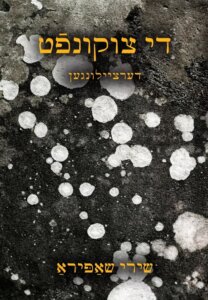
This is a revised version of the original article in Yiddish which you can read here.
Di Tsukunft (The Future)
A book of short stories in Yiddish
by Shiri Shapira
Leyvik House, 2025
You may not have heard about Shiri Shapira yet but you may do so soon. She’s one of the few young Israeli writers who are choosing to write in Yiddish, the language of her East European ancestors. A collection of her short stories was recently published by the Tel Aviv publishing house, Leyvik House, with the support of Israel’s National Authority for Yiddish Culture.
Like the author herself, the protagonists in her new collection of short stories and autobiographical pieces, Di Tsukunft (The Future), are average Israeli men and women with everyday worries about their livelihood, families and health problems. But beneath their daily routine lies a latent personal experience that waits for a critical moment to be revealed. When that moment arrives, the characters often enter a new phase of life.
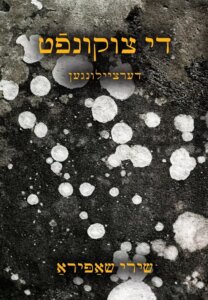
For the 13-year-old heroine of the opening story, also titled “The Future,” this happens in 2001. The terror attacks of 9/11 in New York City coincide with the onslaught of terror in her own town:
“The changes to daily life were immense. A seemingly endless series of discussion circles was held in memory of a victim from our school that I hadn’t known. Every morning I’d have to look at his smiling, pimpled face staring out from the enlarged photo that had been hung by the school gate.”
Thus 2001 ushered in the “terror attacks of the future […] up to the very skies, shining, silvery.” They became an indispensable part of the ‘new normal’ — for Shapira, the State of Israel and the entire world.
The word “future” is both the title of the book, and the name of the first and last stories in the collection. The term is key to Shapira’s work: for the author and her characters alike, the future is dangerous and uncertain.
Notably, “The Future” is also the name of one of the most important Yiddish literary periodicals, Di Tsukunft, published in New York from 1892-2010. In one of the more autobiographical pieces in the collection, also titled “Future”, Shapira writes about cataloging articles of Di Tsukunft for the Index to Yiddish Periodicals at the Hebrew University in Jerusalem. The concluding story “Future” highlights Shapira’s turning to Yiddish, which comes to loom so large in her life.
Shapira shares how she’d initially hoped to read the issues of Di Tsukunft and “learn everything about Jewish history.” Instead, she found herself reading the Israeli press, with its news of terror attacks in Israel, day after day, during the 2015-2016 wave of violence known as the “Intifada of the Individuals.” Israeli reality cancelled out the beautiful, visionary future of those long-ago Yiddish socialists: “What’s there to say about the future? The future’s a thing of the past.”
Shapira recalls: “As a child, I had the impression that I’d come too late for the past, and that someone whose past was shut off to them was of little use for the future.” Shapira references here a national oblivion around the “past”: Israeli society’s longtime neglect of Yiddish and Eastern European Jewish culture.
This neglect, however, served only to awaken her own interest in Yiddish. Historical inquiries and philosophical questions such as this one are woven skillfully into the narrative fabric of her stories.
Shapira’s characters live in Israel and speak Hebrew. Most of them don’t know Yiddish. Shapira herself is a Hebrew writer who has translated a significant number of works from German into Hebrew.
Sometimes Shapira’s tone is bitterly ironic, especially on the subject of the writer’s bleak lot in today’s society. The protagonist of “Self-Portrait as a Hebrew Writer” fantasizes about her ideal reader:
“He comes to an event celebrating my first book, my debut. […] He sits there, looking ridiculously handsome, listening to me babble about the difficult, wrenching labor of writing this text. When the musicians finish their part, he applauds energetically.”
The man reads her book twice and, as she comments ironically, “sees deep into her soul.” Their encounter takes them to the bedroom: “As he climaxes, he lets out a sweet sigh, a melody of contentment — like an enthused, eloquent review.”
So what role does Yiddish play here? Her stories suggest an answer.
In “Earthquake,” an elderly couple, Benny and Dalia, survive an earthquake in Jerusalem. Their modern apartment is unharmed, but many buildings in Shuafat, a Palestinian refugee camp in East Jerusalem, are destroyed, and around 700 people are killed. The couple’s Arab cleaning lady goes missing, and no one knows what happened to her.
For the couple, life goes on as usual. They quickly forget the cleaning lady, especially because they never even knew how to pronounce her name. Jews and Arabs make their home in the same town, but they live in completely different worlds.
Every night, Benny and Dalia eat dinner and nap a bit while watching a TV show. Something new does enter their routine; they sign up for a Yiddish class. Though they barely remember any of the Yiddish their parents once spoke, they hope they’ll “at least learn something before the next earthquake comes.”
The earthquake acts as a metaphor for the dramatic and tragic events that take place in Israel. These misfortunes cut through the monotony of the everyday, but soon enough life goes on as before. In such moments, Yiddish makes its appearance as a sort of phantom of Jewish history from which one might “at least learn something” before the next crisis hits.
Shapira remembers a feeling that used to disturb her as a child: “I was really young, and I thought that everyone besides me knew what to do in every situation, that they were grounded in their lives, while I was the only one floating in the air, not knowing where to land safely.” Yiddish, on the other hand, creates a kind of spiritual shelter, a ‘refuge’ where historical roots can be found.
Shiri Shapira has a keen sense of time in general and of the present moment in particular. In her stories, time flows naturally for months on end, then suddenly brings on changes in the lives of individuals and of society at large. Every day has the potential for danger. Written in Yiddish, Shapira’s stories build imaginary bridges between the troubling present and the past that has nearly disappeared from Israeli memory.
To buy the book, click here.
The post Millennial anxieties are the ‘new normal’ in these Yiddish stories appeared first on The Forward.
Uncategorized
An Arizona cemetery now requires mourners to leave before burial. A rabbi plans to sue.
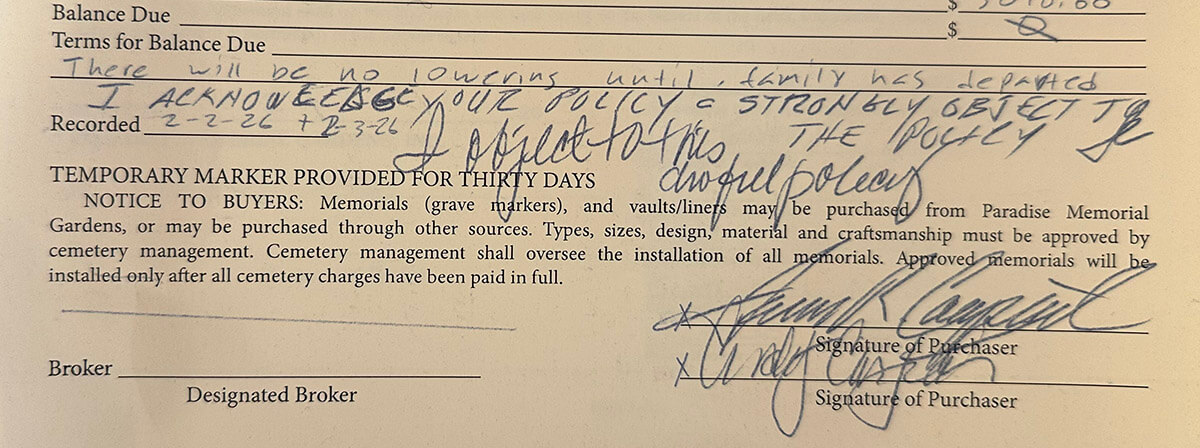
At Jewish funerals, the final act is often the simplest: the casket is lowered into the earth, mourners take turns with a shovel, and the grave slowly fills. It is a moment many rabbis describe as the essence of burial — the point at which ritual, grief and physical reality meet.
At a cemetery in Scottsdale, Arizona, that moment now does not happen.
A new safety policy at Paradise Memorial Gardens requires families to leave before a casket is lowered into the ground. Cemetery officials say the rule, which applies to all funerals, is necessary to prevent accidents, likely involving uneven ground, heavy equipment and mourners overcome with grief. But Jewish clergy say the policy interferes with a core religious ritual, and one local rabbi is preparing a lawsuit.
For Cindy Carpenter, 66, the dispute became painfully personal.
Her younger daughter, Chelsea, died at 33 of cancer in November. As Carpenter arranged the funeral, she and her husband purchased five burial plots at Paradise — for their two daughters, themselves and Chelsea’s husband — expecting the family would be buried together and according to Jewish practice. In total, the plots cost about $50,000, Carpenter said.
Eleven weeks later, Carpenter returned to the same cemetery to bury her older daughter, Cortney, who had significant disabilities and died at 40 after a long illness. Between the first funeral and the second, Carpenter said, the cemetery moved from compromise to refusal.
At Chelsea’s funeral, after intervention from local rabbis, mourners say they were allowed to stay but were placed around 20 feet away behind a rope while the casket was lowered. It was an imperfect accommodation Carpenter said she accepted. She understood the attempt to balance safety and tradition.
When Cortney died at the end of January, Carpenter said, that accommodation was gone. The standardized printed contract for the graveside service had added to it an additional handwritten note at the bottom stating that the casket would not be lowered until the “family has departed.” Carpenter said she was told that they had to leave the property altogether and that her request to stay inside a building at the cemetery and watch from a window was denied. Carpenter and her husband, Jim, signed under protest because the funeral was the next day.
Cindy added her own handwritten note: “I object to this awful policy,” while Jim wrote: “I acknowledge your policy & strongly object to the policy.”
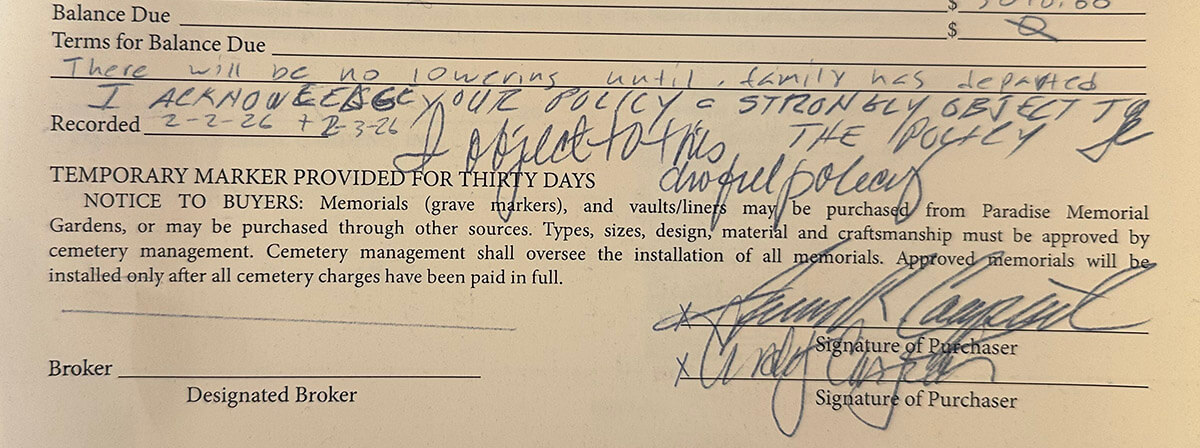
“We’re grieving parents for the second time in 11 weeks,” Carpenter said in an interview. “And you’re telling me I can’t stay to see my daughter buried?”
Rabbi Pinchas Allouche of Scottsdale’s Congregation Beth Tefillah, who officiated at the funerals for both of Carpenter’s daughters, confirmed that everyone who came for Cortney’s funeral was told they could not wait in their cars and had to leave the property. “It was horrible,” Allouche said.
Afterwards, Allouche sent his 24-year-old son back into the cemetery — dressed in a baseball cap and sunglasses — to pretend to be a random person visiting a nearby grave. “From there,” Allouche said, his son “took a video of the lowering of the casket and the covering of the grave for the family to have some slice of comfort in all this.”
Cemetery officials say the rule is not aimed at any one faith. Sabrina Messinger-Acevedo, CEO and owner of Messinger Mortuaries, which operates Paradise Memorial Gardens, said the cemetery is non-denominational and that its safety policies are applied uniformly. She acknowledged the new policy does “not fully align with certain religious traditions,” but said it was adopted after past incidents in which attendees failed to follow staff directions, creating safety concerns.
Messinger Mortuaries operates multiple funeral homes, cemeteries and crematories across Arizona, including Paradise Memorial Gardens, which has a large Jewish section.
Cortney’s funeral was Feb. 3, but the dispute did not gain attention until it was reported by the local news on Feb. 16. Carpenter said the delay was due to the non-stop coverage of the Tucson disappearance of Nancy Guthrie, the mother of Today show host Savannah Guthrie.
Eddie Dressler, a funeral director who has served Atlanta’s Jewish community since the 1990s, said he has never encountered a cemetery policy requiring families to leave before the lowering of a casket. “Having a rule like that is just crazy,” Dressler said.
The only similar restrictions he has seen are at some U.S. Department of Veterans Affairs cemeteries, which open multiple graves at once for logistical reasons — but even there, he said, exceptions are typically made for Jewish burial practices.
Safety and spirituality
Allouche said the rule removes what Jewish law considers the defining moment of burial. The lowering of the casket and the covering of the grave, he said, are not symbolic gestures but the final act of care for the dead — one traditionally performed with mourners present and often participating.
Allouche said he is working with an attorney and expects to challenge the policy, arguing that families who purchased plots in the cemetery did so with the expectation they would be able to bury loved ones according to Jewish practice. Applying the rule without exception, he said, effectively prevents that.
Rabbi Randy Brown, the resident rabbi at Arlington National Cemetery who has officiated at more than 900 funerals there, said safety concerns at gravesides are real. He has personally helped prevent people from falling in “dozens of times.”
But Brown said most cemeteries do not impose blanket bans. Instead, clergy, funeral directors and grounds crews typically coordinate accommodations, such as keeping families at a distance during the lowering and allowing them to return afterward to place earth on the grave, a practice that preserves both safety and ritual meaning.
Graveside funerals, he said, function both as sacred ritual and, with bulldozer equipment nearby, active work sites. Arlington, he added, approaches each burial individually — considering weather, terrain and family needs — rather than applying a single policy to every service.
Brown described the moment when earth strikes the casket as emotionally powerful for many mourners, recalling his own experience at his grandmother’s funeral as “visceral and cosmic.” That meaning, he said, is why cemeteries and clergy typically seek practical compromises. “It’s not one size fits all,” he said.
Religious disputes have surfaced elsewhere. In Atlanta in 2023, for example, a synagogue threatened to sue after a cemetery policy was seen by rabbis as interfering with Jewish burial customs. The cemetery eventually settled.
Allouche said he expects legal action to move forward. Some families who own plots at the cemetery have begun reconsidering their plans, he said, while others are waiting to see whether the cemetery revises its rules or reaches a compromise with community leaders.
Messinger-Acevedo said her company — founded in 1959 by her grandparents, Paul and Cora Messinger — has “deep roots in the community” and a commitment to serve families with “care and compassion.” She said they offer “partial refunds to families who choose to rescind the purchase of an unused burial space” — a complex decision for those with relatives already buried at the cemetery.
Carpenter said the dispute is not something she wanted to fight, but one she felt compelled to pursue. Nearly two decades ago, she founded Cortney’s Place, a day program for adults with disabilities created in her older daughter’s honor, and is now working with local clergy to create “Shabbat boxes” for Jewish patients in hospitals — small packages with challah, candles and grape juice inspired by Chelsea.
“I fought for them all of their life,” Carpenter said. “And this is no different.”
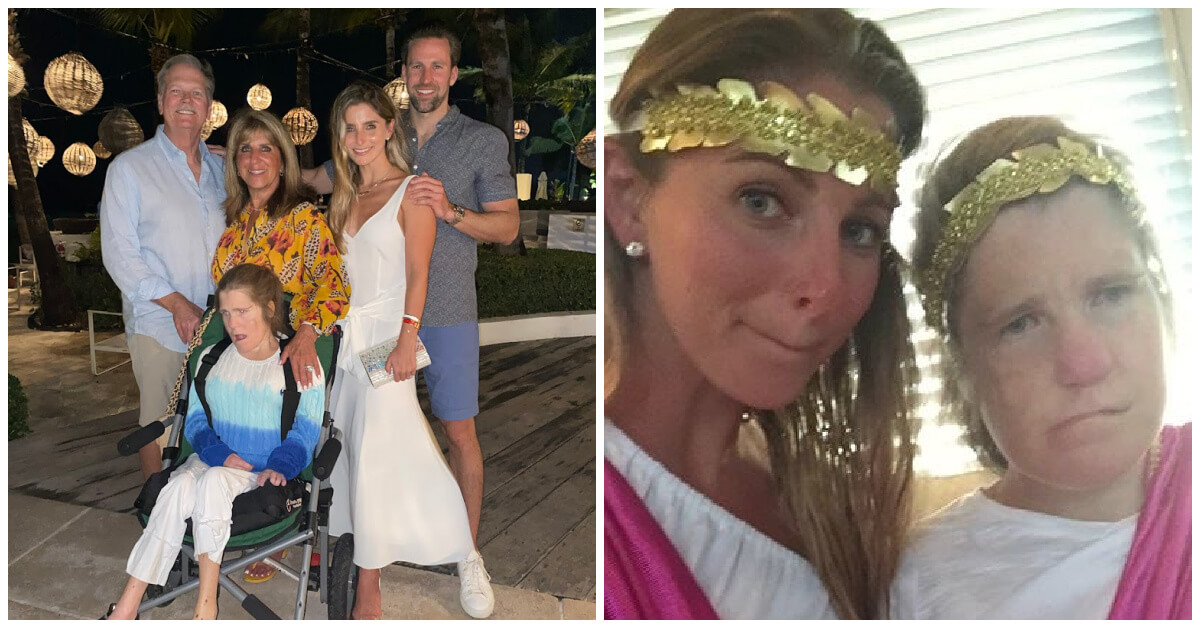
The post An Arizona cemetery now requires mourners to leave before burial. A rabbi plans to sue. appeared first on The Forward.


